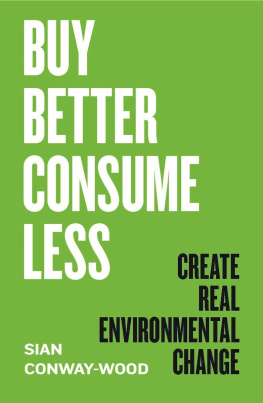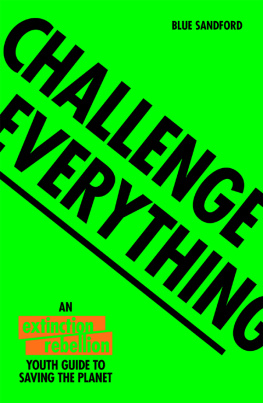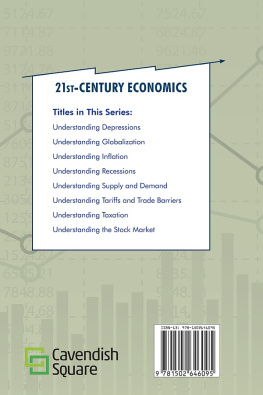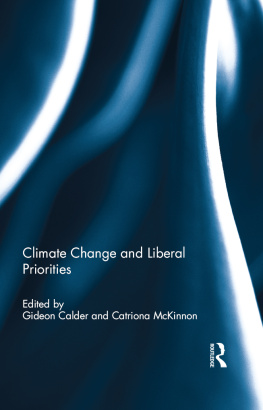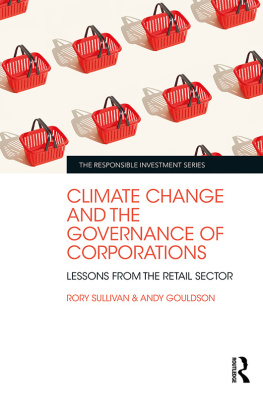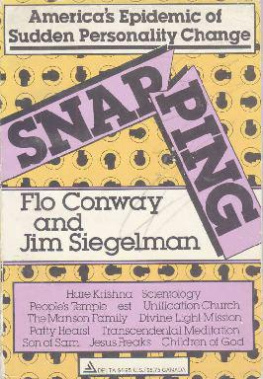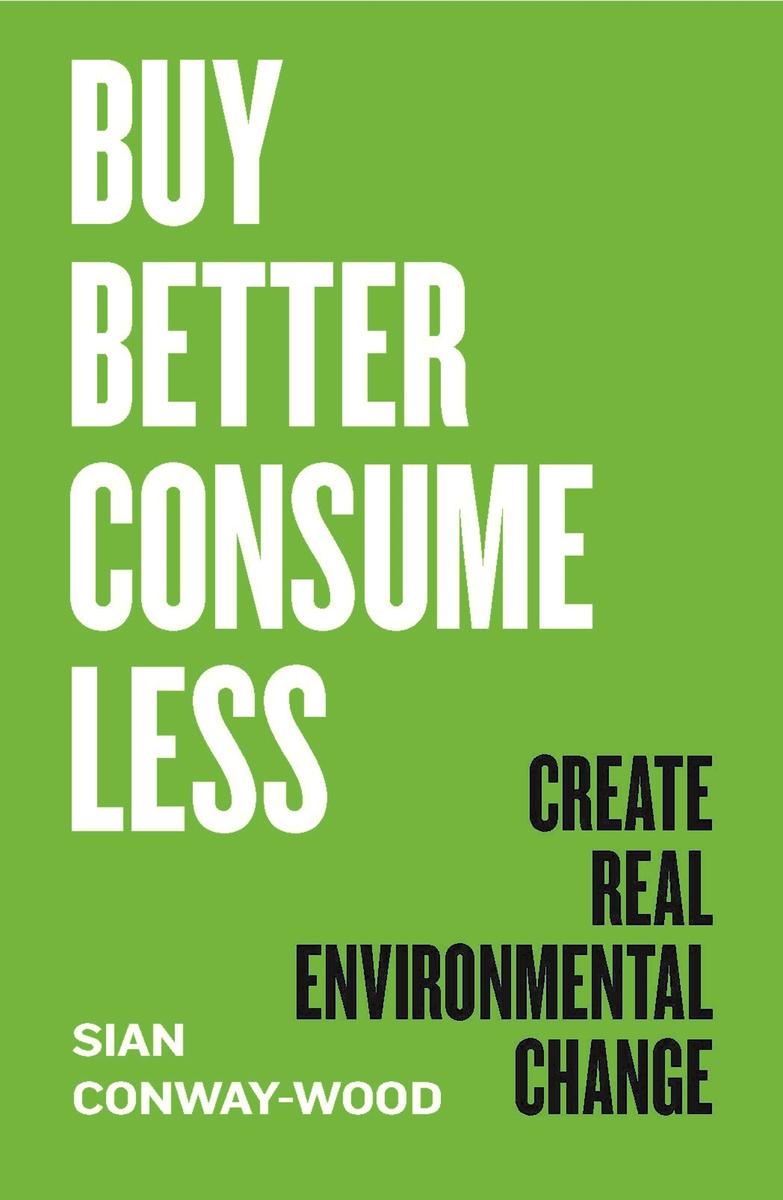Open happiness
Start the day the happy way
Feel good, look good, and get more out of life
W hat do these advertising slogans have in common? They all sell the idea that buying their product will make us happier, but they have something else in common too. They also all belong to some of the worlds biggest brands, who are some of the planets worst polluters, responsible for the waves of plastic waste pouring into our oceans and carbon emissions clogging up our atmosphere.
Everywhere you look, companies are trying to sell you the latest product, with advertising that promises it will make you happier, prettier or more popular, and yet the World Health Organization (WHO) estimates that around one in four people globally have at least one mental health disorder, and psychologists have found that all this consumption is actually making us miserable. In the Western world were working longer hours than ever before, buying more stuff to try to make us feel good, and getting ourselves into debt to try to keep up with the latest trends. And its not just our personal bank balances that are overdrawn. Some of the products we buy are even produced as a result of exploitation, cause harmful pollution in their production and damage our health. Overconsuming is taking its toll on the planet. Were living in overshoot the point at which were using more natural resources each year than nature can regenerate. Which means were borrowing from the future, and our ecological bank balance may soon run out.
Most of us know that advertising makes grand promises that the products we purchase usually fail to live up to. Many of us are also aware that too much shopping is bad for the planet. We even want to do something about it. So why do we find it so hard to make sustainable choices? Perhaps we should look to car manufacturer Hyundais slogan for the answer Prepare to want one. We live in a capitalist society driven by the unlimited pursuit of growth. Corporations use near-constant advertising to manipulate us into spending more, leaving it up to us to make the right choice about the products we buy without giving us all the information about how theyre made or what impact they have.
Were starting to wake up to the realities of climate change, and question what we can do about it. Weve realised what harm business as usual is causing, and were ready to demand change, but were struggling to implement it. It is the wealthy CEOs and shareholders behind our fossil fuel economy who have the real power to change things but they have no incentive to make it happen while they live lives of private luxury, built on the back of our harmful consumption habits. Whole industries, from advertising and automotive, to fashion and Big Oil, are profiting from the status quo, as long as we continue to purchase which is why theyre investing billions in covering up the truth about the climate crisis to keep us spending.
They want us to think theres nothing we can do about it, which is why they carefully control the narratives around climate change in our shops, on our screens and even in the way our countries are run. But increasingly around the world, people are taking back their power, escaping the stronghold of polluting corporations and demanding change. And now its your turn.
Chances are, if youve picked up this book, youve already had that lightbulb moment inspiring you to reduce your impact on the planet. For many of us, it starts with something shocking. Upsetting footage of a whale grieving her dead calf killed by plastic pollution, worry over wildfires destroying homes and animal habitats, or heartbreaking images of orangutans trying to fend off the bulldozers tearing down their rainforest homes. Seeing our favourite species pushed to the brink of extinction, noticing litter mounting up on the kerbs in our local neighbourhoods or even looking out the window at freak weather events that are becoming our new normal.
For me, it began with a pair of trousers. On holiday in Cambodia in 2015, Id spent the day with local artisans, learning about the skill and effort that goes into traditional silk weaving, and admiring the beautiful fabrics they were creating. That night, as I got ready for bed, I noticed that the trousers Id been wearing, purchased cheaply from a high-street retailer in the UK, said Made in Cambodia on the label. Having seen the time and skill it took to weave fabric by hand, I began to wonder, like many ethical fashion activists before me, who made my clothes? And if Id only paid 10 for them, how much did the person making them get paid?
When I got home, I fell down an ethical-fashion rabbit hole, learning about the horrors of modern slavery, exploitation and environmental destruction behind the fashion industry and the cheap clothes I had been, until then, enjoying. As a marketer in my day job, I began to see how people like me were using our skills to sell cheap products that people didnt really need, at a true cost to workers in supply chains and the planet we all share. What started as a mission to clean up my wardrobe eventually turned into a reframe of my entire relationship with consumption. Along the way, I blogged about the things I was learning, and began connecting with other like-minded ethical consumers online. As I met small business owners who were doing all that they could to make their products ethically and sustainably, I witnessed how much they were struggling to compete against big brands with huge advertising budgets, and I knew I could help.
A single made in label led me on a journey of lifestyle changes, new connections and a complete career change, as I left the corporate world behind in 2017 to work with ethical and sustainable small businesses. I started the #EthicalHour community as a Twitter chat, founded on the idea that if we could all dedicate just one hour a week to learning more about ethics, sustainability and how to buy better, we could begin to make improvements without getting overwhelmed. As the network grew, I began teaching small businesses how to be more sustainable and market themselves ethically, drawing together a whole community of people who believe profit shouldnt come at the expense of people and planet. Today #EthicalHour connects over 61,000 people worldwide (growing every day!), united in our mission to create a world where business is a force for good.
But back to Ethical Hours early days, and the start of my journey into sustainable living. I was proud to consider myself a conscious consumer. I spent hours researching brands and carefully considering my purchases. Bamboo coffee flask in hand, I switched to a renewable energy provider at home and sent my friends a referral code to encourage them to do the same. When I signed up for a recycled toilet paper subscription, I proudly shared their discount scheme. I promoted the plant-based meal box I signed up to, and got some free meals when my mum joined too. The more I talked about them, the more my small swaps spread through my social circles and online audience a ripple effect of positive actions that made me think, surely, if enough people cared about the planet, and knew these options existed, we wouldnt be in such a mess?
Since 2017, it has felt like that ripple has become a wave. In the UK, the Blue Planet II documentary brought the reality of plastic pollution into our homes and the tide began to turn overnight. Suddenly everyone seemed to carry reusables. Brands made big pledges about their plastic waste in response to public pressure. Zero-waste shops started popping up on high streets across the country, single-use items like plastic cotton buds were banned and it was slightly easier to find

